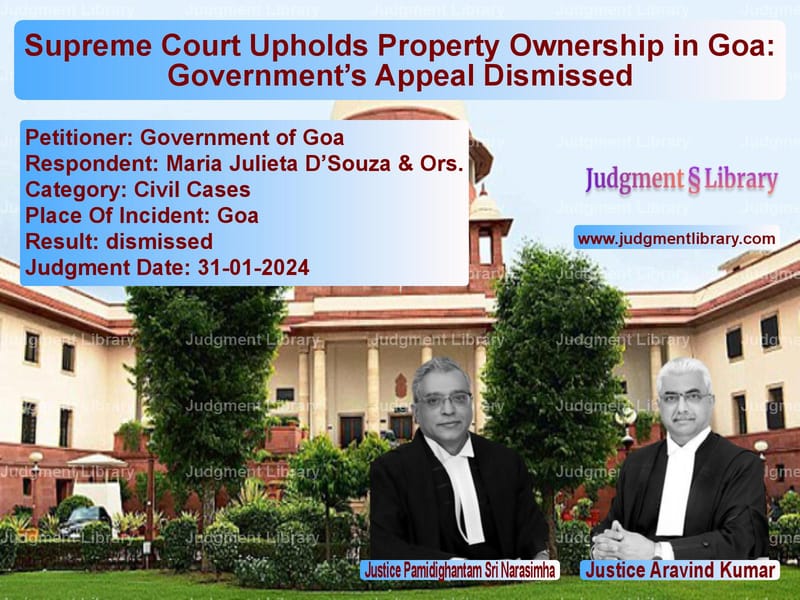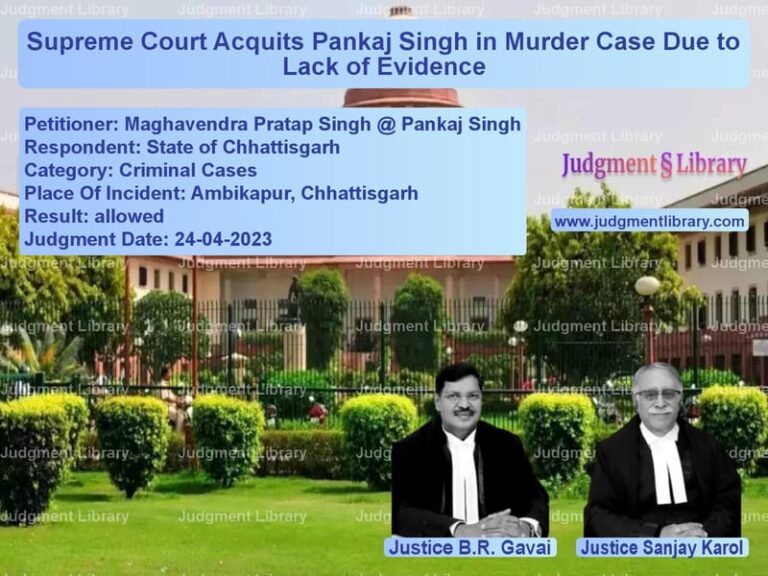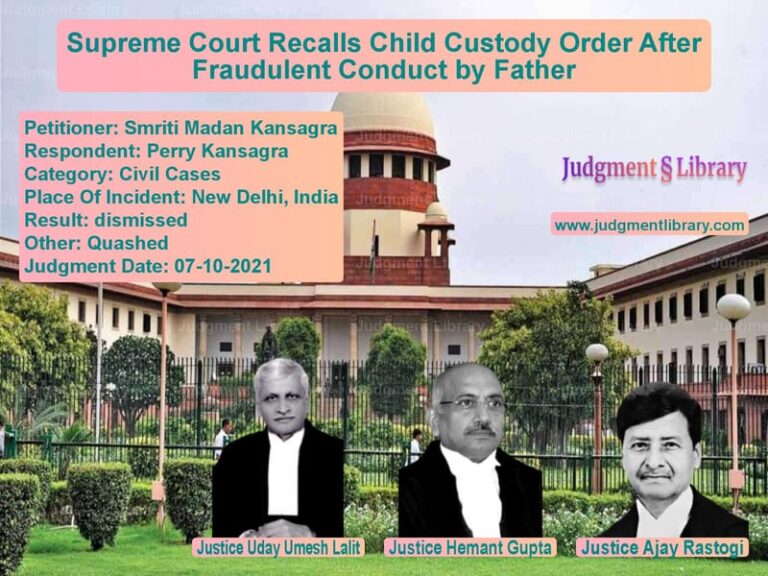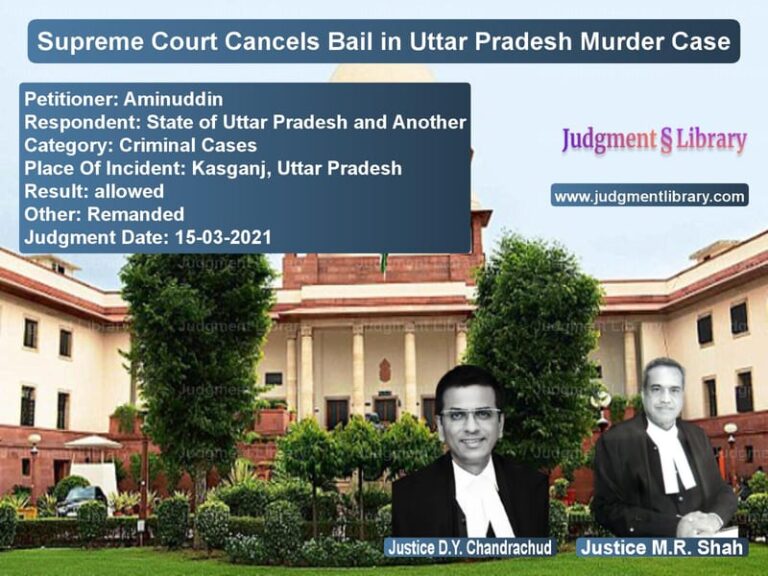Supreme Court Upholds Property Ownership in Goa: Government’s Appeal Dismissed
The Supreme Court of India, in its judgment dated January 31, 2024, upheld the High Court of Bombay at Goa’s decision affirming Maria Julieta D’Souza’s ownership over disputed land, rejecting the Government of Goa’s appeal. The Court ruled that the High Court correctly applied legal principles and evidence to establish the plaintiff’s title, and there was no basis for interference.
Background of the Case
The dispute centered around land ownership claimed by Maria Julieta D’Souza and others, which was contested by the Government of Goa. The plaintiffs had sought a declaration of title and an injunction against the State. The Trial Court dismissed the suit, holding that the plaintiffs had failed to produce clear documentary evidence of ownership and that the suit was barred by limitation.
Read also: https://judgmentlibrary.com/supreme-court-restores-land-acquisition-case-after-32-year-legal-battle/
The plaintiffs then appealed to the High Court of Bombay at Goa, which reversed the Trial Court’s decision. The High Court found that the plaintiffs had provided sufficient documentary evidence tracing their ownership and continuous possession of the property, thus establishing title. It also ruled that the suit was not barred by limitation, as the Government had not raised this issue effectively before the Trial Court.
Aggrieved by the High Court’s ruling, the Government of Goa filed an appeal before the Supreme Court.
Key Legal Issues
- Whether the plaintiffs had sufficiently established their title to the disputed land.
- Whether the High Court erred in shifting the burden of proof onto the State instead of requiring the plaintiffs to prove their ownership.
- Whether the suit was barred by limitation.
Petitioner’s Arguments (Government of Goa)
The Government of Goa, represented by counsel Ms. Ruchira Gupta, argued that:
- The plaintiffs failed to produce a single definitive document proving their ownership.
- The High Court incorrectly placed the burden of proof on the State instead of requiring the plaintiffs to establish their title.
- The High Court improperly focused on proof of possession rather than title.
- The Trial Court had correctly analyzed the facts and dismissed the suit, and the High Court erred in overturning its decision.
Respondent’s Arguments (Maria Julieta D’Souza & Ors.)
The plaintiffs, represented by Senior Advocates, contended that:
- Their title was established through multiple documents, including deeds and possession records, proving continuous ownership.
- The High Court correctly reappreciated the evidence and reached a lawful conclusion.
- The Government’s argument about burden of proof was misleading, as the plaintiffs had already provided substantial evidence.
- The suit was well within the limitation period, and the Government had failed to effectively challenge this aspect before the Trial Court.
Supreme Court’s Observations
The Supreme Court carefully analyzed the issues raised in the appeal.
1. Proof of Title
“The High Court referred to multiple pieces of evidence, orders, and documents and strung them together to come to a clear conclusion that the title subsists in the plaintiff.”
The Court ruled that while no single document conclusively proved title, the combination of multiple pieces of evidence was sufficient to establish ownership by preponderance of probability.
2. Burden of Proof vs. Standard of Proof
“There is a clear distinction between burden of proof and standard of proof. The High Court did not shift the burden of proof but applied the correct standard of preponderance of probability to assess ownership.”
The Court clarified that in civil cases, ownership does not always have to be proven through a single document but can be established through a combination of legal and factual evidence.
3. Suit Not Barred by Limitation
“The plea of limitation was not actively pressed by the Government before the Trial Court, and the High Court correctly found that the suit was within the statutory period.”
The Supreme Court held that the limitation argument was not properly raised at the Trial Court level and could not be entertained at the appellate stage without merit.
Final Judgment
The Supreme Court dismissed the Government of Goa’s appeal, affirming the High Court’s decision. The Court ruled:
“For these reasons, Civil Appeal arising out of judgment of the High Court in First Appeal No. 282 of 2007 dated 21.10.2010 is dismissed.”
The Court found no merit in the Government’s arguments and upheld the plaintiffs’ title over the property.
Key Takeaways from the Judgment
- In property disputes, ownership can be established through a combination of documents rather than a single definitive proof.
- The standard of proof in civil cases is based on the preponderance of probability, not beyond reasonable doubt.
- Once ownership is proven, possession naturally follows unless rebutted by strong evidence.
- Failure to raise the limitation issue effectively at the Trial Court stage weakens the argument in higher appeals.
This ruling reaffirms the principles of property law, judicial discipline, and evidentiary standards in civil litigation.
Petitioner Name: Government of Goa.Respondent Name: Maria Julieta D’Souza & Ors..Judgment By: Justice Pamidighantam Sri Narasimha, Justice Aravind Kumar.Place Of Incident: Goa.Judgment Date: 31-01-2024.
Don’t miss out on the full details! Download the complete judgment in PDF format below and gain valuable insights instantly!
Download Judgment: government-of-goa-vs-maria-julieta-d’souz-supreme-court-of-india-judgment-dated-31-01-2024.pdf
Directly Download Judgment: Directly download this Judgment
See all petitions in Property Disputes
See all petitions in Succession and Wills
See all petitions in Judgment by P.S. Narasimha
See all petitions in Judgment by Aravind Kumar
See all petitions in dismissed
See all petitions in supreme court of India judgments January 2024
See all petitions in 2024 judgments
See all posts in Civil Cases Category
See all allowed petitions in Civil Cases Category
See all Dismissed petitions in Civil Cases Category
See all partially allowed petitions in Civil Cases Category







